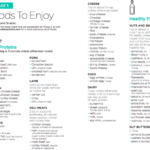Is The South Beach Diet Healthy? This question, pondered by countless dieters, delves into the heart of a popular weight-loss plan. The South Beach Diet, known for its phased approach to carbohydrate restriction, promises rapid weight loss and improved health markers. But does the science support these claims? We’ll dissect the nutritional profile, explore potential health impacts, both positive and negative, and examine its long-term sustainability.
Ultimately, we aim to equip you with the knowledge to decide if this diet aligns with your health goals and lifestyle.
This in-depth analysis will cover everything from the macronutrient breakdown of each phase to a comparison with healthier dietary approaches like the Mediterranean diet. We’ll also address concerns about potential nutrient deficiencies and explore the suitability of the South Beach Diet for individuals with specific health conditions, such as diabetes or heart disease. Get ready to uncover the truth behind this popular weight-loss method.
Sustainability and Practicality of the South Beach Diet: Is The South Beach Diet Healthy

The South Beach Diet, while effective for initial weight loss, faces scrutiny regarding its long-term sustainability and practicality. Its success hinges not just on adherence to its initial phases but on seamlessly integrating its principles into a balanced, lifelong approach to eating. This requires careful consideration of meal planning, cost, social dynamics, and the overall feasibility of maintaining the diet’s restrictions over an extended period.
The diet’s success in the long run depends heavily on the individual’s ability to adapt its core principles to their lifestyle and maintain a balanced approach to nutrition and healthy habits. A key factor influencing long-term adherence is the diet’s perceived restrictiveness and its impact on social situations.
A Sample Weekly Meal Plan
A successful South Beach Diet plan prioritizes lean protein, healthy fats, and non-starchy vegetables. It emphasizes whole, unprocessed foods and minimizes refined carbohydrates and sugary drinks. The following sample meal plan offers variety and nutritional adequacy, illustrating how to navigate the diet’s phases while maintaining satiety and avoiding nutritional deficiencies. Remember to adjust portion sizes based on individual caloric needs and activity levels.
Monday: Breakfast: Scrambled eggs with spinach and mushrooms; Lunch: Grilled chicken salad with mixed greens, avocado, and a light vinaigrette; Dinner: Baked salmon with roasted asparagus and quinoa. Tuesday: Breakfast: Greek yogurt with berries and a sprinkle of nuts; Lunch: Turkey breast and lettuce wraps; Dinner: Lean ground beef stir-fry with plenty of vegetables. Wednesday: Breakfast: Oatmeal with berries and a small amount of nuts; Lunch: Leftover ground beef stir-fry; Dinner: Chicken breast with steamed broccoli and sweet potato.
Thursday: Breakfast: Smoothie with protein powder, spinach, and berries; Lunch: Tuna salad (made with avocado instead of mayonnaise) on whole-wheat crackers; Dinner: Pork tenderloin with green beans and a small portion of brown rice. Friday: Breakfast: Scrambled eggs with tomatoes and onions; Lunch: Leftover pork tenderloin; Dinner: Shrimp scampi with zucchini noodles. Saturday: Breakfast: Whole-wheat pancakes (made with whole wheat flour and a small amount of sugar) with berries; Lunch: Salad with grilled chicken or fish; Dinner: Steak with a side salad and roasted vegetables.
Sunday: Breakfast: Omelet with vegetables and cheese; Lunch: Leftovers; Dinner: Chicken and vegetable skewers.
Long-Term Feasibility of the South Beach Diet
Maintaining the South Beach Diet long-term presents challenges. The initial restrictive phases can be difficult to sustain, especially during social events involving meals outside the home. The cost of high-quality ingredients, such as lean meats and fresh vegetables, can also be a significant barrier, particularly for individuals with limited budgets. Furthermore, the diet’s emphasis on avoiding certain food groups may lead to feelings of deprivation and increase the risk of relapse.
Successful long-term adherence often requires significant lifestyle changes and a strong support system. For example, a family who decides to adopt the diet together will likely find it easier to maintain than someone trying to follow it alone, constantly surrounded by tempting, less healthy options.
Convenience and Cost-Effectiveness, Is The South Beach Diet Healthy
Compared to other popular weight-loss plans, the South Beach Diet’s convenience and cost-effectiveness are moderate. While it requires some meal preparation, it doesn’t necessitate the purchase of expensive pre-packaged meals or supplements. However, the cost of high-quality ingredients can be higher than those found in less healthy diets. This compares unfavorably to some diets that utilize inexpensive, processed foods, but those diets often lack the nutritional value and long-term benefits of the South Beach Diet.
Meal prepping can mitigate some of the convenience challenges, allowing for efficient meal planning and portion control throughout the week.
Incorporating South Beach Principles into a Balanced Lifestyle
The key to long-term success with the South Beach Diet lies in adopting its principles as a lifestyle change rather than a temporary diet. This involves focusing on healthy eating habits, such as choosing lean proteins, incorporating plenty of vegetables, and limiting processed foods and sugary drinks. Regular exercise is also crucial. Instead of strict elimination, prioritize gradual changes.
For instance, gradually reduce refined carbohydrate intake by substituting whole-grain options, focusing on portion control, and increasing physical activity. This approach promotes sustainable weight management and overall well-being, preventing the yo-yo effect often associated with restrictive diets. For example, instead of completely eliminating bread, one might transition to whole-wheat bread and reduce serving sizes. This gradual approach makes the transition more manageable and increases the likelihood of long-term adherence.
The South Beach Diet, while potentially effective for short-term weight loss, presents a complex picture regarding long-term health. While it may improve certain blood markers initially, the restrictive nature raises concerns about nutrient deficiencies and sustainability. Ultimately, the best approach to weight management is a balanced, holistic plan that prioritizes whole foods, portion control, and regular exercise, tailored to your individual needs and health status.
Before embarking on any restrictive diet, consult a healthcare professional or registered dietitian to ensure it aligns with your unique circumstances.

